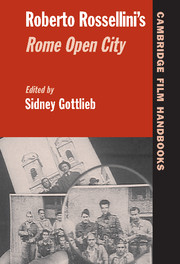Book contents
- Frontmatter
- Contents
- Acknowledgments
- List of Contributors
- Introduction: Open City: Reappropriating the Old, Making the New
- 1 Rossellini, Open City, and Neorealism
- 2 The Making of Roma città aperta: The Legacy of Fascism and the Birth of Neorealism
- 3 Celluloide and the Palimpsest of Cinematic Memory: Carlo Lizzani's Film of the Story Behind Open City
- 4 Diverting Clichés: Femininity, Masculinity, Melodrama, and Neorealism in Open City
- 5 Space, Rhetoric, and the Divided City in Roma città aperta
- 6 Mourning, Melancholia, and the Popular Front: Roberto Rossellini's Beautiful Revolution
- REVIEWS OF OPEN CITY
- Filmography
- Select Bibliography
- Index
2 - The Making of Roma città aperta: The Legacy of Fascism and the Birth of Neorealism
Published online by Cambridge University Press: 09 February 2010
- Frontmatter
- Contents
- Acknowledgments
- List of Contributors
- Introduction: Open City: Reappropriating the Old, Making the New
- 1 Rossellini, Open City, and Neorealism
- 2 The Making of Roma città aperta: The Legacy of Fascism and the Birth of Neorealism
- 3 Celluloide and the Palimpsest of Cinematic Memory: Carlo Lizzani's Film of the Story Behind Open City
- 4 Diverting Clichés: Femininity, Masculinity, Melodrama, and Neorealism in Open City
- 5 Space, Rhetoric, and the Divided City in Roma città aperta
- 6 Mourning, Melancholia, and the Popular Front: Roberto Rossellini's Beautiful Revolution
- REVIEWS OF OPEN CITY
- Filmography
- Select Bibliography
- Index
Summary
PROBLEMATIC QUESTIONS IN THE HISTORIOGRAPHY OF THE ITALIAN CINEMA
For may Decades after its first screening, critical considerations of Rossellini's breakthrough film accepted several fundamental assumptions. Contemporary critics and historians argued that Rossellini's masterpiece embodied a new and innovative quest for “realism” in the postwar Italian cinema. Furthermore, they believed that this post-war realism (now dubbed “neorealism” - “new realism”) marked a sharp break with the history of the Italian cinema and with the films made during the years that the Fascist regime governed Italy (1922–1943). The need to define the future direction of Italy's national cinema in terms that would underline discontinuity with the past rather than continuity was understandable at the time: all Italians of every ideological persuasion wanted desperately to put the war behind them. However, all too often such an attitude has created a misunderstanding about the historical development of Italian cinema in the crucial period that signals its transition from the years before 1945 to the years afterward. It is a fascinating paradox that Roma città aperta continued many of the stylistic characteristics of cinema produced during the Fascist era, but it embodied, at the same time, a clear antifascist ideology that attempted to reconcile all of the different and conflicting political positions of the various groups making up the Italian antifascist Resistance.
All too many ideological, political, and personal interests were served in Italy with the facile assertion that Italian neorealism marked an abrupt break with the past. Directors, actors, acriptwriters, bureaucrats, and administrators in the cinema industry or in government.
- Type
- Chapter
- Information
- Roberto Rossellini's Rome Open City , pp. 43 - 66Publisher: Cambridge University PressPrint publication year: 2004
- 5
- Cited by



